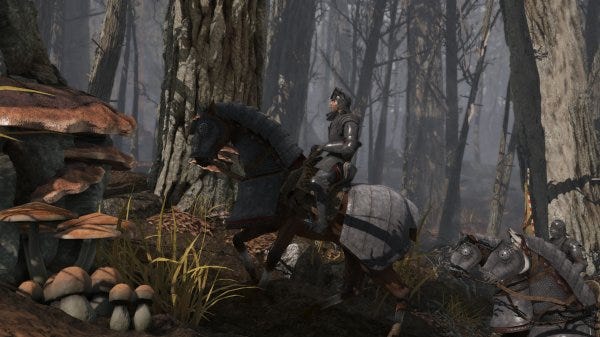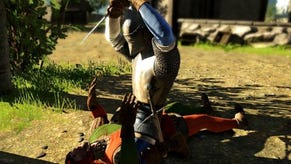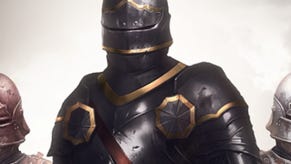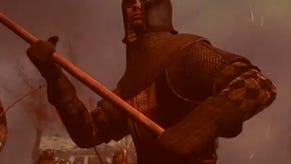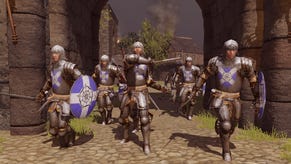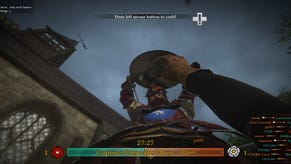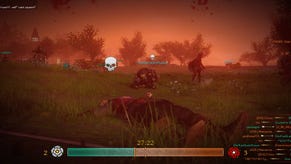Kingdoms/Horses: War of the Roses Interview
Coming Up Smelling
Following on from our reveal of Paradox's "team-based multiplayer melee combat experience", the medieval horse-and-sword game War Of The Roses, our roving reporter Dan Griliopoulos interviewed the developers at GamesCom; when he wrote this, he was stuck in an open-top car on a motorway somewhere in Italy in 40 degree heat, transcribing furiously and dying of exposure. The interviewees are Martin Wahlund of developer Fatshark and Gordon Van Dyke of Paradox.
RPS: The opening credits say “Staffordshire, England, 1471”. Why Staffordshire? (apart from Stafford being the birthplace of the creator of games journalism, Kieron Gillen, fact-fans - Ed).
Wahlund: I don't want to spoil anything but one of the battles in the campaign might well be in Staffordshire.
RPS: I don't think that's spoiling anything, that might well be history. (The Battle of Blore Heath was in Staffordshire in 1459 and 1471 is the end of the War of Roses - Ed)
Wahlund: Obviously, yes, but we haven't specified yet the story of the campaign.
Van Dyke: It will be a fixed character, just think of the series of Rome. This fictional character's path will cross real historical characters; we wanted the liberty of creating our own fictional character and having the player experience the era through him.
RPS: I have to admit, I don't actually know that much about The War of the Roses; where did most of the combat take place, in the midlands?
Van Dyke: It was further North; the south was a different group. This time period was the death of chivalry, where projectile weapons like guns and cannons started to play a bigger and bigger role, until it changed over so guys were no longer running around with shiny armour on horseback.

RPS: So it's from that point of Agincourt onwards, where massed knights don't win the battle but archers do? Does it parallel the Sengoku era you're exploring in the eponymous game, where gunpowder so rapidly shifted power in fedual Japan?
Van Dyke: That same thing happened in Japan during the dynasty era so, yeah, that exact same; that didn't inspire this though. The guy who's writing the story for that took that time period, the Sengoku Jidai, and invested himself in that. I think it's kind of an interesting parallel as well, because you have a more dynamic weapon environment. You can pick and choose from a variety of battles, which is interesting for multiplayer, which is the primary focus of this game. It's going to be a third-person perspective, which intuitively goes into a different perspective depending on the situation you're in. If you pull out a bow and you're running around, you'll be in third person. The camera is going to be dynamic so you can best view what's around you and you can make the best decision, if you're a good player. If you're a bad player... Martin was describing it yesterday that you take the sword and swing it, and the camera's going to move further over your right shoulder, to give you a better perspective of your enemy, how they're responding to your attack; when you pull out the bow, it's going to zoom in across your shoulder and get tighter to a more first person perspective. It's similar to Gears of War, how they do it, they have the right way to display those different perspective.
Wahlund: I don't think the player will realise that the camera actually moves, because it'll have tiny, small movements.
Van Dyke: Not to jar the person out of the experience.
RPS: What's the best analogue for the scale and style of the multiplayer combat? You have the same levelling up system that we've seen in multiplayer combat, like Modern Warfare, that we've not seen in.
Van Dyke: Mount and Blade. They're the game that set the new standard for melee combat. Not that ours is exactly the same but they do a lot of things right. We're all big fans of the game. There was one first person shooter game that came out and started using WASD and the mouse for looking, and set the standard for all first person shooters after that. Doom had a weird system, didn't even use the mouse. And there was one when you pressed the button, if you went to the right you'd swing left... there were a lot of people still exploring and experimenting how to make that control set right. I see Mount and Blade as the one that kind of set that standard. We're making it more specific to us and we want to really focus on making it really accessible, so that when someone gets in there they can cquickly do something and be somewhat effective, but add a lot so there's a lot to master and accomplish.
Wahlund: If you're vogue, you can say that we want to do Modern Warfare multiplayer in a medieval setting?
RPS: Will you have a larger scale than Modern Warfare?
Van Dyke: We want to be bigger, but we want to ensure that players have the best experience. We're working with the engine, we're looking at net code; we want to put the most amount of players that has the best gameplay at the same time. We don't want to just shove as many players in there as possible for a back-of-the-box feature kind of number, that feels really smart for the experience. In terms of the balance between team play and individual skill, obviously the era gives the impression that it's more about massed archers or spearmen or cavalry charges, but a multiplayer game necessitates giving people the freedom to do their own thing. How do you reconcile those two?
Wahlund: This is something we really need to beta-test. We don't want to force people to play in a certain way; we're not going to make 64 players consist of 16 archers, 16 horsemen and so on; we don't want to do that. There will be differences between the different classes; we want to make it a team game, so you work as a group; two knights and a lot of archers might work.
RPS: A knight defending an archer seems natural to me, like a heavy defending a medic in Team Fortress.
Van Dyke: Exactly! The way the levels are designed, we're going to try to create as many unique levels as possible, so you have different experiences. Not every class is going to be the best in every area; if you're in a heavily-wooded area, of course the archers are going to have a much more difficult scenario. If you're in a castle and there's lots of narrow passages...
Wahlund: For example, we have a field. Obviously, mounted men or archers will dominate, but you will have certain ways you can get around if you're a footman, through bushes and villages. The environment will have choke-points so you can play as all the classes.
Van Dyke: If you hold your shield up... in our playtests, the archers have never actually dominated. The shield is very effective to block those things; we make sure it feels right. When you're making a videogame, there's always the fine line dance between simulation and arcadey. What we want to do is we want to make really fun, believable scenario that also players really feel like that they're living out an adventure, which does lean more towards the arcadey side.

RPS: I vaguely remember a Napoleonic era mod for Half-Life that involved endless slow loading and reloading whilst you all ran around in circles.
Wahlund: The gunpowder weapons of the time were really unreliable, even though they're powerful. We haven't decided what we'll do.
Van Dyke: Should we have them explode on you? (laughs)
Wahlund: Like with Warhammer Fantasy Battle, you roll a 1 and it explodes, killing the guy who fired. We could have this, but we haven't decided. With the bows, you have to pull back and aim, so it takes some time and adjust for its drop – so it's not that easy to master. It's probably most effective at 15-20 metres, so you have maybe one or two arrows before they close on you.
Van Dyke: Yeah, if you get close to an archer, they have to pull out their sword. To defend themselves, they don't have a shield, so they're left up to parrying and parrying is intrinsically more difficult than just getting wide blocks with your shield. We're trying to make sure it's not super-easy and that everyone can run around and ‘own’, but accessible enough that everyone can get in there without being devastated. We're also focusing on the single player to make sure that, if you play that, it does have a value in building up your skillset to play in multiplayer.
Wahlund: You can also drop and drop out from games as you want. It means if you find yourself on a server where everyone is really really good, you can leave and join a new server without having to wait in a queue.
Van Dyke: We're going back more to the classic server-browser scenario. When people set up their servers, they can have their favourite map up 24/7. We want to bring back the control the community had over their experience. It sometimes sucks as a developer if your maps get ignored; a little panda dies in your heart. But if they find that one which they're so passionate about, why force them to play the other ones? We need to learn from the good one what we did wrong with those other maps that made the players like it so much. We want to give as much control to the community as possible, so they can shape the game, but also put lots of things in there that they like, to give them the experience we wanted to deliver.
RPS: Tripwire have been giving very early versions of their Red Orchestra II code to pro-am mod teams, so that good mods are available near to launch. Is that something you'd consider?
Wahlund: We have to set up the basic core mechanics, try a few levels and see how it works. We're going to bring people in really early for beta-testing, but we're not sure about mod tools yet. I'm sure there will be at some point.
Van Dyke: I got into the industry via modding, so in my heart I always want to give tools away. They make the games that are extremely niche, that maybe 500 people get into and are passionate about; to be honest, for ourselves, we would like to make a game like that as well, but it does narrow the audience that it is going to appeal to. The beauty of mod tools is that give that ability to somebody to take your game and make that narrow experience for the people really want it.
RPS: How are horses going to work in multiplayer?
Wahlund: It's quite easy to kill a horse; take a two-handed sword and slash... take it apart. You have the speed of horses, but they are still horses; they move like horses. It takes a short time to stop, they're slow to turn like in real life. You have the speed advantage, but it's also harder to hit someone from a horse; we will balance for multiplayer settings. All the weapons will have strengths and weaknesses. We've not decided whether to keep it in, but if you shoot from a horse, it's really hard to hit.
RPS: You might have to save that for the expansion pack, Mongolian Invasion... how does the combat actually work in this game? It's two men with swords and shields hitting each other, so how do you actually control that?
Wahlund: You block with button, thrust with the other, move the mouse... it's not the same as Mount & Blade, but we've tried to make it intuitive.
Van Dyke: mouse gestures. Right-click is a defensive position, to bring it up, and move it around with the mouse.
Wahlund: There's no auto-aim at all, so you can really try to hit particular parts of the body. If you try to parry, that's thrusting also, so you need to direct where it's going to be. It's collision-based, the parry. However, the shield will break after a certain amount of damage.
RPS: Will that be the same throughout the single-player campaign too, item damage? Will swords break?
Wahlund: Yep. We don't have plans for swords to break... yet. It's still very early in the design process. It's the same for ammunition. When the core gameplay's set, then we'll play a few sessions with unlimited ammo and some without, and decide depending on what's fun.
RPS: I imagine you're not talking about the story yet?
Wahlund: They're still writing the story.
RPS: Any other stupid areas of Northern England I might recognise, apart from Lancaster and York? (Dan is from Northern England, information-addicts - Ed)
Wahlund: This project is not a one-off; we're going to keep working on it after release, so we might release more missions over the following years in the DLC.
RPS: If you've got DLC in mind, this must be a long-term project then?
Wahlund: We have in mind a lot of locations; some in the first release, some in DLC. We're aiming for a brand that lasts for years; it's much more fun to be able to listen to the community over time, or occasionally tell them they're wrong.
Van Dyke: A perfect example of that is when I used to work at DICE on Battlefield. There were these two guns and they were identical in all aspects of functionality; the only difference was the texture and sound effect and people swore that one of them was more powerful than the other. And that's when they're wrong. Perception is reality; one had more bass to the firing than the other, so they assumed automatically that it was more powerful. They wanted us to nerf it! “Oh, that one's the noobcannon.” I want to make clear though, that we're not just doing the lazy option of putting out a map-pack and charging for it. We're giving away the maps for free. We do have to make money from this, through developing content, but we want to do it in a smart way, we don't want people to buy something because we've forced them to so they can play with their friend. We want to keep the community together at all costs, even if it costs us money.
RPS: Thanks for your time.
